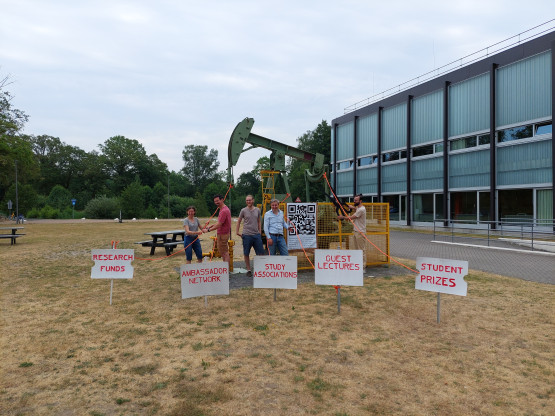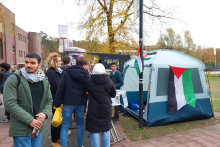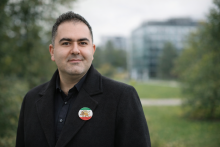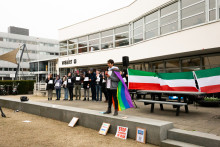‘The campus is politically neutral’, starts Waleed Taqatqa, an undergraduate student who co-organized the stand-in for Palestine, ‘where support is given - but only if one asks for it.’ He mentions feeling ‘thankful about the interest of passersby as their questions and condolences led to conversations about things beyond filtered national newspapers.’ He enlists the protests in support of Ukraine and support for earthquakes in Turkey and Syria as other instances of political engagement on campus.
On the contrary, Leon van der Neut, a postgraduate student who was a member of the University Council and was a board member at ISO (The Dutch National Student Association), remarks that ‘it is unconventional for students and staff at the university to take a stand in national or geopolitical matters that are not directly impacting them or that is not of concern to their work. Critical discussions about geopolitics may not naturally come up in coding classes or math.’
Mohammed Sagafhi, a PhD candidate who was active in the Iran protests held on campus last year, opines that while it is understandable for people to be less aware of international issues, the general attitude shown by most towards geopolitical injustices is along the lines of ‘something that goes on somewhere, that is not my business.’ He adds that while different communities have different engagement levels, alongside murmurs of support for the LGBTQ+ community, climate activism has a prominent presence on campus.
'Palestinian food was the ice breaker that led to conversations about the suffering of those who eat this daily' - Waleed Taqatqa
Patricia Reyes, a PhD candidate and a member of both Extinction and University Rebellion, has been at the forefront of the climate activism movement. She adds that ‘while there is a lot of initiative from students and staff as a response to the unfolding ecological crises, management does not provide satisfactory platforms to advance these efforts.’
Barriers and catalysts
What contributes to the political climate of an educational institution? The four interviewees identify various factors, organizations and events. With regards to the UT, Reyes comments that urgent demands do not fall on deaf ears, as the executive board provided a series of events like the Sustainability dialogues. While there has been an increase in engagement with climate activism on campus in recent years with initiatives that take the form of groups like the Vegan Association or Scientist Rebellion, Reyes worries that ‘they lack support, as the community is not sufficiently informed.’
For Taqatqa, ‘the institutional values of freedom of speech and critical thinking are encouraging’. He says they help students to organize events. ‘Palestinian food was the ice breaker that led to conversations about the suffering of those who eat this daily. A lack of such perspectives often lead people to not engage’, says Taqatqa. While discussing platforms that amplify political concerns, Sagafhi commends organisations like Amnesty UTwente. 'Despite being smaller than other organizations, Amnesty hosts events with face-to-face meetings and exchanges with people from all over the world.'
The UT itself does have its own kind of political system in place, with participation bodies like the university council, faculty councils and service councils. ‘The public meetings between the executive board and the university council encourage participation from the university population’, says Van der Neut, to then add cautiously: ‘But only in a technocratic sense. While there are rights to consent and opportunities to advise, they only pertain to what the university’s capacities are and not in terms of making strong statements.’



Iran, climate and Ukraine protests on campus (in 2022 and 2023).
‘Bandaids’ and ‘skills’
When asked why the UT campus is maybe not as politically active as other Dutch universities, van der Neut voices his suspicions in accordance with Taqatqa and Reyes. In response to whether the limited political engagement results from the UT being a technical university, the three answer in varying degrees of agreement. While Taqatqa says, ‘Partially…yes,’ he qualifies it by asserting that ‘being human, people must engage no matter what or where they study’.
'Learning to position oneself in societal debates is also a skill to be learnt' - Leon van der Neut
Reyes comments that technology is regarded as ‘a bandaid’ for political problems, where mobilisations are also thought about through technical frames. Van der Neut agrees and emphasizes that ‘learning to position oneself in societal debates is also a skill to be learnt’. Sagafhi differs from the rest and says that ‘the low international population of the university’, in comparison to other universities across the Netherlands, may be the reason why such discussions are not taking place. ‘More diversity leads to more sharing of stories and perspectives.’
Texturing Political Discussions
Despite varying perspectives, all interviewees emphasize the value added by the narratives of the international community. While Taqatqa expresses gratitude ‘for engagement from various nationalities, Americans, Germans, people of all colours’ and van der Neut appreciates ‘international perspectives’, Sagafhi maintains that the campus is ‘not international enough.’ Reyes additionally advocates for ‘better empowerment of international students to confidently contribute to the conversation’, highlighting the importance of scholarships to be provided by the institute.
'Political deliberations should strive to move beyond snacks and forced positivity' - Patricia Reyes
Student initiatives, institutional platforms, associations and events aside, all four do mention the little political activities that occur, but add in their own perspectives of it being ‘not enough’, - whether it be in terms of ‘uncomformable discussions facilitated by larger institutional platforms’ for Reyes or the ‘scope of the international community’ as per Sagafhi, ‘the culture to not take a strong stances in terms’, for Van der Neut, and ‘the help provided only if asked for’ as per Taqatqa.
Hence, despite acknowledging some political activities on campus, all interviewees express a sense of inadequacy. Reyes suggests that for the campus to become more politically engaged. ‘Difficult conversations are essential and must be encouraged. Political deliberations should strive to move beyond snacks and forced positivity.’






